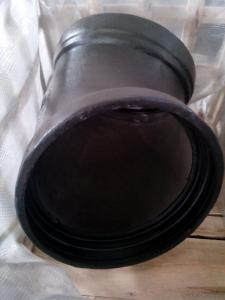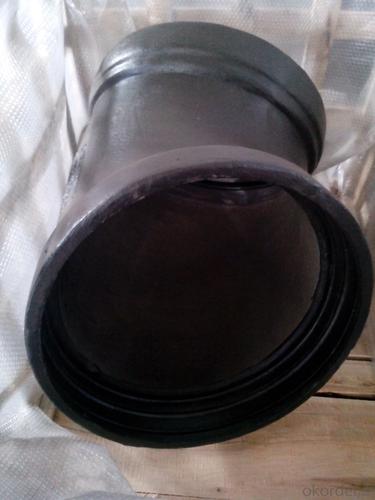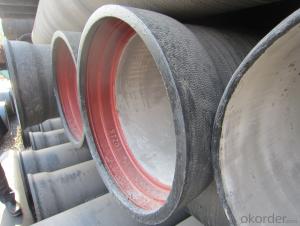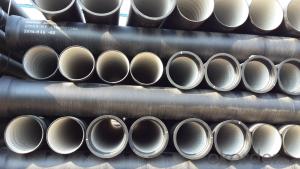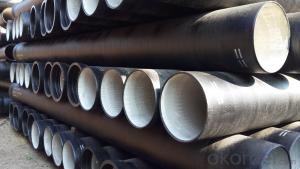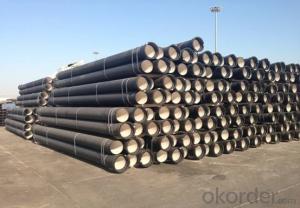DUCTILE IRON PIPE DN100 k
- Loading Port:
- Tianjin
- Payment Terms:
- TT OR LC
- Min Order Qty:
- -
- Supply Capability:
- 30000Tons m/month
OKorder Service Pledge
OKorder Financial Service
You Might Also Like
CNBM ductile iron pipe ranges from DN80-DN1600mm (T-Type, Class K9), effective length 6m, comply with ISO2531 Standard
Company Profile
CNBM International Corporation is the leading production base and renowned supplier of Ductile Iron Water Pipe systems of both potable and waste water in China. We are constantly looking to develop high quality products to ensure the longest service life and wonderful performance.
CNBM Pipelines regard quality as the essential factor leading to successful business. Every pipe is tested in accordance with BS EN545 (water application) or BS EN598 (sewer application). CNBM Pipelines products comply with and are tested according to the relevant European and International Standards. Our pipes are manufactured under the quality management system BS EN ISO 9001. After years of efforts, CNBM Pipelines has built up great reputation in terms of quality and service among customers worldwide
Product Introduction
CNBM ductile iron pipe ranges from DN80-DN1600mm (Tyton, T-Type, Class K7/K8/K9), effective length: 6m, complying with BS EN545/EN598/ISO2531/BS4772.
Specification& Payment terms
Internal lining: Pipes shall have an internal cement mortar lining in acc with ISO4179.
External coating: Pipes shall be externally coated with metallic zinc spray plus a further layer of resin painting to ISO8179.
Gasket: 100% SBR/NBR/EPDM gasket in accordance with ISO4633.
Packing: Pipes from DN100 to DN300 be bundled with steel belts, the others are in bulk.
Payment term: By 30% T/T advance payment + 70% Irrevocable L/C at sight.
Packing: In bulk vessel or in container.
- Q: Why is the sound speed of nodular cast iron lowered after heat treatment?
- After the heat treatment, the microstructure of the material changes, the graphite changes, eliminating the internal stress of molecules, thus slowing down the speed.
- Q: Can ductile iron pipe be repaired if it gets damaged?
- If ductile iron pipe sustains damage, it can indeed be repaired. The process of repair entails the removal of the damaged section and the subsequent substitution with a fresh section. Typically, a pipe cutter, a specialized tool, is utilized to achieve a seamless cut on both ends of the affected area. Once the damaged portion is extracted, a new section of ductile iron pipe is affixed securely by employing mechanical couplings or welding. To safeguard the pipe's integrity and functionality, it is crucial to adhere to the manufacturer's guidelines and industry standards during the repair procedure.
- Q: What is the composition of ductile iron pipes?
- Ductile iron pipes are primarily composed of iron, along with small amounts of carbon, silicon, and other alloying elements. The iron content typically ranges from 90% to 94%, while carbon content is usually around 3% to 4%. Silicon is added in the range of 1.5% to 3%, which helps enhance the ductility and strength of the iron. Other alloying elements such as manganese, sulfur, and phosphorus may also be present in smaller quantities. The composition of ductile iron pipes is carefully engineered to achieve specific properties. The addition of carbon and silicon improves the hardness and strength of the iron, making it more suitable for demanding applications. The presence of these alloying elements also contributes to the ductility of the pipes, allowing them to be easily bent and molded without breaking. Overall, the composition of ductile iron pipes is designed to provide a balance between strength, ductility, and resistance to corrosion. This makes them ideal for use in water and sewage systems, where they can withstand high pressure, handle heavy loads, and resist the corrosive effects of water and other chemicals.
- Q: How are ductile iron pipes protected against internal corrosion?
- Ductile iron pipes are protected against internal corrosion through a combination of various preventive measures. One of the primary methods is the application of a protective coating on the inner surface of the pipe. This coating acts as a barrier between the pipe and the transported fluid, preventing direct contact and minimizing the chances of corrosion. Another common method used is the application of a cement mortar lining. This lining further enhances the protective barrier, reducing the likelihood of corrosion even in aggressive environments. The cement mortar also provides a smooth surface, reducing friction and improving the flow of water or other fluids through the pipe. In addition to coatings and linings, ductile iron pipes are often designed with corrosion-resistant alloys or additives. These alloys, such as zinc or epoxy, are added during the manufacturing process and provide an extra layer of protection against internal corrosion. They act as sacrificial anodes, corroding over time to protect the underlying iron from degradation. Regular maintenance and inspection are also crucial in protecting ductile iron pipes against internal corrosion. Monitoring the condition of the protective coatings, identifying any signs of degradation or damage, and promptly addressing any issues are essential to ensure the long-term integrity of the pipes. Overall, a combination of protective coatings, cement mortar linings, corrosion-resistant alloys, and regular maintenance efforts work together to effectively protect ductile iron pipes against internal corrosion, extending their lifespan and ensuring the safe transportation of fluids.
- Q: How much is a ductile iron pipe dn400?
- Ductile iron pipe nominal diameter is 80 ~ 2200 mm, compared with grey cast iron, high strength, good toughness, thin wall metal, less dosage, and can withstand high pressure, effective length of 5 meters, 6 meters and 8 meters; according to the different thickness of P, G two. It is the development direction of cast iron pipe.
- Q: How does ductile iron pipe perform in areas with high ground movement?
- Areas with high ground movement are well-suited for the exceptional performance of ductile iron pipe. Its unique properties and design ensure a high resistance to deformation and damage caused by ground shifting, settling, or seismic activities. The material's ductility enables it to withstand significant stress and strain without fracturing or breaking, setting it apart from rigid materials like cast iron or PVC. Ductile iron pipe's ability to flex and absorb ground movement prevents catastrophic failures and guarantees the integrity of the pipeline system. Moreover, ductile iron pipe is manufactured with various joint configurations that enhance its performance in areas with high ground movement. Flexible joints, like restrained or mechanical joints, effectively accommodate movement by allowing limited rotation and translation, minimizing the risk of pipe separation or joint failure. Additionally, the robust construction of ductile iron pipe, featuring a thick wall thickness and high tensile strength, offers added protection against ground movement. This strength enables the pipe to withstand external loads and forces induced by the ground, maintaining its structural integrity and preventing deformation. To summarize, ductile iron pipe is an excellent choice for areas with high ground movement due to its exceptional ductility, flexible joints, and robust construction. Its ability to absorb ground movement while ensuring the functionality and safety of the pipeline system establishes it as a reliable and durable option in challenging environments.
- Q: Comparison of ductile iron pipe and spiral steel pipe
- Spiral welded pipe: inner wall smooth, welding connection, a small amount of pressure, need additional anti-corrosion
- Q: Are ductile iron pipes suitable for underground installations?
- Ductile iron pipes are well-suited for underground installations. They are made from a highly sturdy and durable material that can handle the various pressures and strains commonly found in underground environments. Moreover, they possess exceptional resistance to corrosion, which makes them an excellent choice for underground applications that might expose them to moisture, soil, and other corrosive elements. Additionally, these pipes have a high tensile strength, enabling them to withstand external loads and prevent cracking or breakage caused by ground movement or heavy traffic. Furthermore, ductile iron pipes have a longer lifespan compared to other materials, making them a cost-effective option for underground installations. On the whole, ductile iron pipes are a dependable and appropriate choice for underground applications because of their durability, corrosion resistance, and long-term performance.
- Q: Can ductile iron pipe be recycled?
- Indeed, the recycling of ductile iron pipe is possible. Ductile iron, a variant of iron often employed in pipe production owing to its remarkable robustness and endurance, can be melted down when it reaches the conclusion of its productive lifespan. By utilizing the resultant molten iron, fresh items can be fashioned. This method of recycling not only aids in the preservation of precious natural resources but also lessens the necessity for raw materials and energy-intensive procedures utilized in the fabrication of novel pipes. Furthermore, the recycling of ductile iron pipe serves to diminish waste and contributes to a more sustainable and ecologically conscious approach to the advancement of infrastructure.
- Q: Will the quality of ductile iron shrink?
- Fool you. It is normal that the surface shrinks and goes down, but it can not be said to be good.
Send your message to us
DUCTILE IRON PIPE DN100 k
- Loading Port:
- Tianjin
- Payment Terms:
- TT OR LC
- Min Order Qty:
- -
- Supply Capability:
- 30000Tons m/month
OKorder Service Pledge
OKorder Financial Service
Similar products
Hot products
Hot Searches
Related keywords
